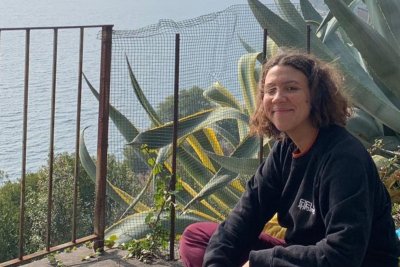
Firstly, what do you do in sustainable food and farming?
I am a food anthropologist, writer, chef and activist and I work for Farmerama Radio making a podcast about regenerative farmers. I also spent two years working for Oxford Real Farming Conference (ORFC).
What was your route into the sector?
I’ve always loved cooking so after university I did a vegan cooking training course then worked as a chef in some restaurants before going freelance. Whilst freelance I did a Masters in Anthropology of Food at SOAS University which really connected the dots between food consumption and food production and allowed me to explore the ethical implications in terms of labour, land justice, race and gender, pesticide use and animal production throughout the whole system. During this time, I also started volunteering with community food charity Made In Hackney which campaigns on health inequalities and food access. All these things got me tapped into the exciting world of sustainable food sector!
What changes have you seen in the movement since getting involved?
One of the biggest changes has been the conversation around race and land access and healing through the land. I wrote my thesis on this and at the time [in 2021] it was quite an underexplored topic. When I told people about it they were quite confused because they didn’t think there were any black food growers in the UK. There are organisations that have been working on this topic for a long time and in the last few years these issues are becoming central to many more conversations across the movement which is fantastic. There’s still a lot more work to do but it seems like there is genuine progress being made.
I’ve also noticed the mainstreaming of more people moving to regenerative and organic farming and farmers from industrial chemical-based agriculture.
Who or what has inspired your work in this movement?
The farmers and growers I get to work with inspire me the most. My main role is storytelling – both through my work on the podcast and also as a chef telling the story through a meal. I’m really inspired every day by people working on the land as it’s so very hard, can be isolating, and not financially beneficial. It’s inspiring seeing people care about the animals and plants around them, and having a holistic relationship with nature.
I also look to elder activists who have been campaigning for marginalised communities for a long time - the people that have been in the game since the ‘80s and are still just as active and passionate as they ever have been.
Eating is a real source of inspiration. I really love going to restaurants where they’ve taken meticulous care on sourcing and using ingredients, how the business is run to be ethical and equitable and where chefs are innovative around sourcing, seasonality and avoiding pesticides. It gives me hope that the food system in general can move in that direction.
What are your hopes for the future?
I have a vision of a food system where everyone has the opportunity to learn about food growing, to be on the land and have their hand in the soil, regardless of their background, community, age, race, sexuality or ability.
It would be great to see a food system much more integrated into communities with children in schools learning about farming and people in urban areas being able to see where their food comes from, where every kind of person has access to healthy food that is grown without chemicals.
I also think that the only way to achieve a fair food system is to recognise the historic damage that has been done through imperialism and colonialism internationally and I think that reparations are an essential part of this transition across the global food system.
I’m currently in Jamaica for five months with my partner, who is a gardener and botanist working on my personal hope for the future which is to set up a project on my ancestral family land to connect with local growers, community organisers and queer spaces. The dream is that within a few years someone in and from Jamaica will be running a food and farming project on the land that is working with the local community, perhaps working on conservation or habitat preservation, and is queer inclusive.
What advice would you give to anyone that is passionate about sustainable food systems and wants to work in this sector?
Get involved in you local community garden – it’s a great way to meet people. Not everyone can offer their time for free as that is a privilege however these connections can sometimes lead to paid worth. It’s also really worthwhile connecting with people that might be interested in the same thing as you.
Speak to people in bakeries and restaurants that you like, find out what they’re doing. Go to events, talks and workshops. The Oxford Real Farming Conference in January, Groundswell in July and the Land Skills Fair are all great ways to connect and learn.
And lastly, what do you love to eat?
I love foraging! For mushrooms specifically, as they’ve always been one of my favourite foods. The fact that you can find these in your local park in a city really excited me. I particularly like oyster mushrooms and honey fungus.
You can follow Dora on Instagram @dorstaylor and @peashootfeasts.



